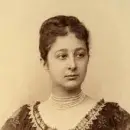
Zelia Nuttall
Zelia Nuttall was an archaeologist and anthropologist of pre-Columbian Mexico, best known for her discovery of forgotten Mixtec manuscripts, including the Codex Zouche-Nuttall that is now in the British Museum.
Born in San Francisco, California, to Irish and Mexican parents, she was educated in France, Germany, Italy, and at Bedford College (now part of the University of London). Her first paper on the small terra-cotta heads that she found at Teotihuacan, published in 1886 in the American Journal of Archaeology, attracted attention in scholarly circles and won her appointment as honorary special assistant in Mexican archaeology at Harvard University’s Peabody Museum (a position she held for forty-seven years) as well as fellowship in the American Association for the Advancement of Science in 1887.
She published several important works, including The Fundamental Principles of Old and New World Civilization, Book of the Life of Ancient Mexicans, and New Light on Drake: Documents Relating to His Voyage of Circumnavigation, 1577–1580. In 1895, she was the seventh woman and first anthropologist elected to the American Philosophical Society. In 1904, she served as field director of the Reid-Crocker archaeological mission from the University of California, where she was already an adviser in the creation of the department of anthropology. In 1908, she was made honorary professor at the National Museum of Mexico.